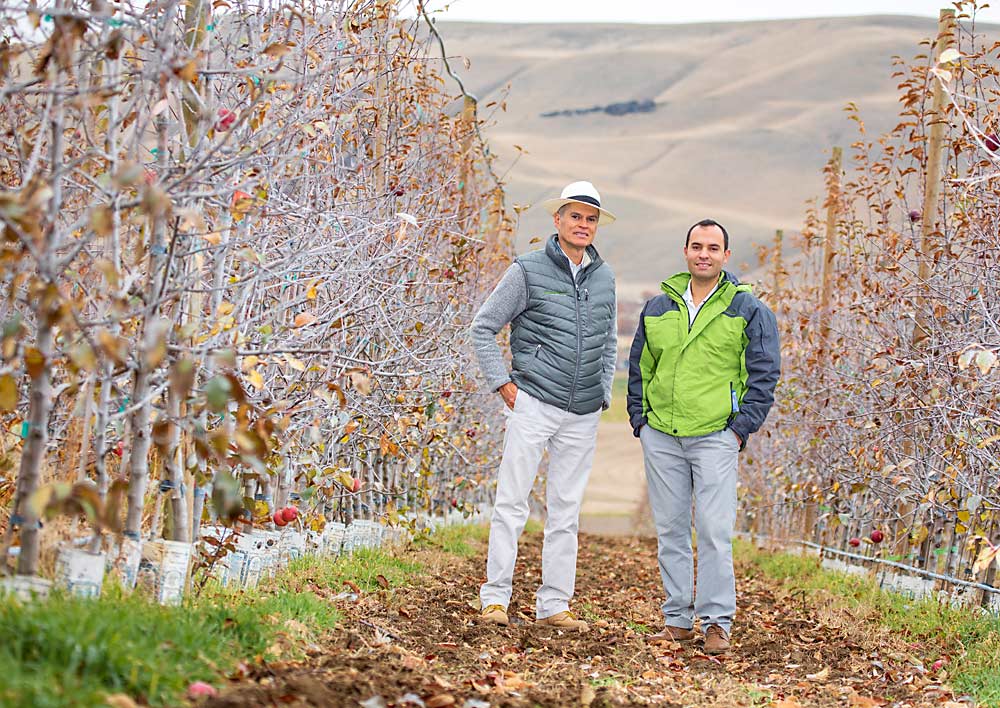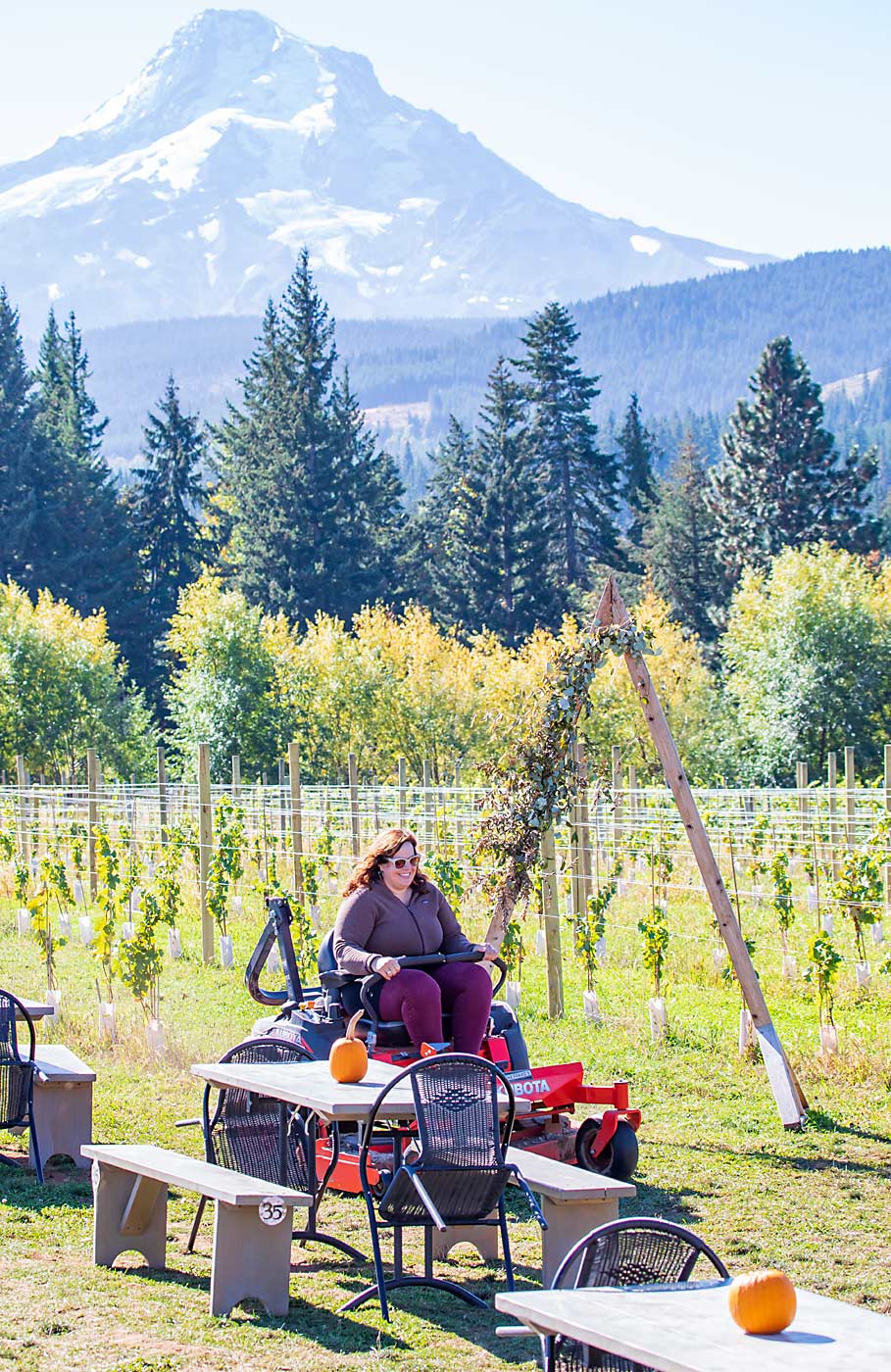
Nursing and farming may seem like two very different careers, but for one grower in Oregon’s Hood River area, pursuing both has set her up for success.
Trina McAlexander, who owns Mt. View Orchards and Grateful Vineyard winery and cidery, said she chose nursing as a career path because its flexibility and financial security aligned with her dreams of eventually buying her parents’ 50-acre farm, which she did in 2015. The income from her nurse practitioner career makes it possible for her to make the land payments and secure financing to grow her on-farm hospitality businesses.
“I do a lot of normalizing around off-farm jobs,” she said. “I just want people to know that for anybody who doesn’t come from family money, it’s hard work on and off the farm.”
According to U.S. Department of Agriculture data, off-farm income is the norm for farming families today. According to a 2019 report, off-farm income provides 70 percent of the household income for all family farms. Even for midsized and large family farms — those with an annual gross cash farm income between $350,000 and $1,000,000 — off-farm jobs comprise about half of family incomes.
“It’s unfortunate that our farms cannot support families anymore,” said Sawyer Werner, a fifth-generation grower from Oroville, Washington, who works full time for ApRecs, a farm recordkeeping platform, in addition to farming with his parents and grandfather. His wife is studying for a nursing degree, and once she is working full time, he plans to transition into the farm full time and serve as a consultant for ApRecs.
For growers getting started, a day job presents one of the best ways to be successful, said Nestor Garcia, a credit officer with Northwest Farm Credit Services’ AgVision program, which aims to support beginning farmers with favorable loan terms to help them qualify and additional resources to help them succeed.
“For folks that want to start farming from scratch, the full-time job pays their bills, and anything that is made on the farm goes back into growing the business,” he said. As a lender, the outside income reduces the risk of a new farm venture failing at the first bad break, he said, and it helps farmers grow into a more financially secure position more quickly. “It’s just a really nice safety net.”
But Garcia doesn’t want to discount the fact that it’s a lot of hard work to follow that path. He started on it himself last year, when his father, a recently retired engineer, suggested that they go in together on a small orchard in Benton City, Washington.
“I always wanted to get into farming, but actually doing it is really hard. I spray at night and then go to work,” Garcia said. Now, he shares his firsthand perspective with clients. “The lack of sleep, the stress of doing a full-time job well and also managing a farm, I tell people the time management is probably twice what they are expecting.”
The 20-acre farm they purchased — a mix of Galas, organic Pink Ladies and WA 38 (Cosmic Crisp) — has a profit margin of $15,000 to $20,000. That’s not enough to support their living, especially after losing half of the crop to frost last spring. They hope to expand to 60 acres over the next few years.
“Having the off-farm income allows us to do it — not comfortably, it feels like a pinch — but safely,” Garcia said. “I’m not unique here. I’m literally just copying and pasting what I’ve seen other growers do” during his years with Northwest Farm Credit.
Some of the clients he’s helped with financial planning are returning the favor now, helping him plan spray programs and learn the ropes of organic requirements.

Sometimes, an off-farm job helps established growers weather a financial rough patch, too. Gabe Dahle, who co-owns a cherry orchard in The Dalles, Oregon, with his father, took a job with Orchard and Vineyard Supply a little over five years ago. Now, he’s starting to think about how best to integrate back into the farm that’s running well without him.
“I really want to come back and be in support, looking for ways to improve things,” he said. “From what I’ve learned working outside the orchard, that’s something I want to bring back.”
Off-farm jobs can be a benefit to the farm, too. Zillah, Washington, cherry grower Mark Hanrahan said he took a job with the Valley Fruit warehouse when he was starting out so that he’d have the income needed to renovate the orchard he inherited. Years later, he still works part time as a field representative for Legacy Fruit Packers, because things he has learned from the job have made him a better grower.
For his Legacy Fruit Packers colleague, orchard manager Rob De La Rosa, his own orchard has always been something of a hobby — a moneymaking hobby that’s become less fun as it got harder to scratch a profit from the aging 21-acre orchard of pears and Reds he took over from his father.
“I’m on the phone a lot, on the road a lot, so when I got home, it was nice to jump on the tractor and mow. It was almost relaxing for me,” De La Rosa said. “But back then, I was making extra money. I always said if I needed to pull from my job to supplement the ranch, I’d sell it.”
Now 60 and looking for more time with his grandkids, he’s slowly pulling out the acres that are barely breaking even. Earlier in his career, he thought about buying more orchards to build into something that could support a family, but since his daughters didn’t seem interested in inheriting a farm, and he liked his job, he decided he didn’t really need another one, De La Rosa said.
Grower Tom Schneider said his 33-year career with the Yakima Fire Department has always been his passion, but he couldn’t let go of the 60-acre orchard in Zillah, where he grew up, either. So, a few years ago, he took over the farm with big, old Bing cherry blocks, low productivity pears and freestanding apples.
“Because of my job with the fire department, we’ve been able to pay for the redevelopment,” he said. “Slowly but surely, I’m eking my way into it, trying to manage my debt load.”
He and his wife, Arcelia, don’t have any full-time employees. She runs the irrigation and works with the seasonal crews while his shift schedule at the fire station — 50 hours in a row — leaves him four days off each week to devote to the farm.
Schneider dismissed the notion that, because he already has another career, the farm represents a hobby.
“The labor, the chemicals, the fuel, the trees, the trellises, everything is very expensive. I don’t know how hobby farmers do it,” he said. “There is no choice, you have to be committed to turning a profit at the end of the day.”
—by Kate Prengaman






Leave A Comment